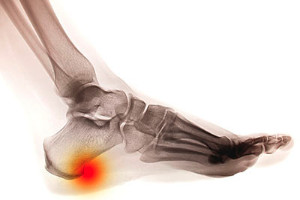 Severe pain in the heel may be indicative of a heel spur. This condition can develop as a result of the aging process, or from participating in running and jumping activities. Additionally, patients who wear shoes that do not fit correctly, are overweight, or have endured an injury to the heel may be candidates for heel spurs. Some of the symptoms that are associated with this condition can consist of redness, tenderness, and an achy feeling in the heel and surrounding area. It may appear swollen and cause difficulty in walking. Many patients have found moderate relief when the feet are elevated, and shoes that are worn have adequate cushioning. If you feel you may have a heel spur, it is advised that you seek the counsel of a podiatrist who can properly treat this condition.
Severe pain in the heel may be indicative of a heel spur. This condition can develop as a result of the aging process, or from participating in running and jumping activities. Additionally, patients who wear shoes that do not fit correctly, are overweight, or have endured an injury to the heel may be candidates for heel spurs. Some of the symptoms that are associated with this condition can consist of redness, tenderness, and an achy feeling in the heel and surrounding area. It may appear swollen and cause difficulty in walking. Many patients have found moderate relief when the feet are elevated, and shoes that are worn have adequate cushioning. If you feel you may have a heel spur, it is advised that you seek the counsel of a podiatrist who can properly treat this condition.
Heel spurs can be incredibly painful and sometimes may make you unable to participate in physical activities. To get medical care for your heel spurs, contact one of our podiatrists from Lovely Foot Associates, PC. Our doctors will do everything possible to treat your condition.
Heels Spurs
Heel spurs are formed by calcium deposits on the back of the foot where the heel is. This can also be caused by small fragments of bone breaking off one section of the foot, attaching onto the back of the foot. Heel spurs can also be bone growth on the back of the foot and may grow in the direction of the arch of the foot.
Older individuals usually suffer from heel spurs and pain sometimes intensifies with age. One of the main condition's spurs are related to is plantar fasciitis.
Pain
The pain associated with spurs is often because of weight placed on the feet. When someone is walking, their entire weight is concentrated on the feet. Bone spurs then have the tendency to affect other bones and tissues around the foot. As the pain continues, the feet will become tender and sensitive over time.
Treatments
There are many ways to treat heel spurs. If one is suffering from heel spurs in conjunction with pain, there are several methods for healing. Medication, surgery, and herbal care are some options.
If you have any questions feel free to contact our office located in Johnstown, PA . We offer the latest in diagnostic and treatment technology to meet your needs.
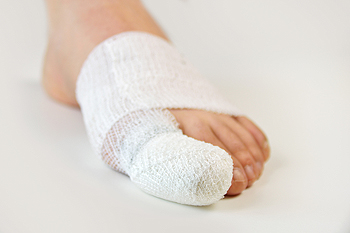 Research has shown the importance of promptly treating a broken toe. This may help to ensure proper healing of the fractured toe. Some of the symptoms that are typically associated with a broken toe can consist of bruising, swelling, and having difficulty moving the toe. For mild breaks, an effective treatment consists of taping the injured toe to an adjacent toe. This is referred to as buddy taping. This type of treatment generally provides the stability that is needed as the healing process occurs. The average recovery time for a broken toe to heal is approximately four weeks. During this time, your toe may feel better when walking is limited, and keeping it elevated may also help to alleviate any existing swelling. If you have broken your toe, it is advised that you seek the counsel of a podiatrist who can help you to manage this condition.
Research has shown the importance of promptly treating a broken toe. This may help to ensure proper healing of the fractured toe. Some of the symptoms that are typically associated with a broken toe can consist of bruising, swelling, and having difficulty moving the toe. For mild breaks, an effective treatment consists of taping the injured toe to an adjacent toe. This is referred to as buddy taping. This type of treatment generally provides the stability that is needed as the healing process occurs. The average recovery time for a broken toe to heal is approximately four weeks. During this time, your toe may feel better when walking is limited, and keeping it elevated may also help to alleviate any existing swelling. If you have broken your toe, it is advised that you seek the counsel of a podiatrist who can help you to manage this condition.
Broken toes may cause a lot of pain and should be treated as soon as possible. If you have any concerns about your feet, contact one of our podiatrists from Lovely Foot Associates, PC. Our doctors will treat your foot and ankle needs.
What Is a Broken Toe?
A broken toe occurs when one or more of the toe bones of the foot are broken after an injury. Injuries such as stubbing your toe or dropping a heavy object on it may cause a toe fracture.
Symptoms of a Broken Toe
Although the injured toe should be monitored daily, it is especially important to have a podiatrist look at your toe if you have severe symptoms. Some of these symptoms include worsening or new pain that is not relieved with medication, sores, redness, or open wounds near the toe.
If you have any questions, please feel free to contact our office located in Johnstown, PA . We offer the newest diagnostic and treatment technologies for all your foot care needs.
Read more about What to Know About a Broken Toe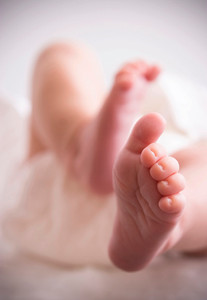 Research has shown that the majority of babies are born with flat feet. Feet are flexible and will become stronger as the walking process occurs. The grasping action of the toes will help the overall strength of the foot grow as children begin walking barefoot while indoors. When shoes are purchased, it is beneficial to measure the feet to determine the correct length and width. This can help in choosing the right shoe size. Additionally, it is important to make sure there is adequate room for the toes to move freely in. Potential skin problems may be reduced when the shoes are aired out overnight and clean socks are worn on a daily basis. Children may walk with their feet turned in or out, and may straighten out as they get older. If you notice any abnormal walking patterns in your children, it is suggested that you consult with a podiatrist.
Research has shown that the majority of babies are born with flat feet. Feet are flexible and will become stronger as the walking process occurs. The grasping action of the toes will help the overall strength of the foot grow as children begin walking barefoot while indoors. When shoes are purchased, it is beneficial to measure the feet to determine the correct length and width. This can help in choosing the right shoe size. Additionally, it is important to make sure there is adequate room for the toes to move freely in. Potential skin problems may be reduced when the shoes are aired out overnight and clean socks are worn on a daily basis. Children may walk with their feet turned in or out, and may straighten out as they get older. If you notice any abnormal walking patterns in your children, it is suggested that you consult with a podiatrist.
The health of a child’s feet is vital to their overall well-being. If you have any questions regarding foot health, contact one of our podiatrists of Lovely Foot Associates, PC. Our doctors can provide the care you need to keep you pain-free and on your feet.
Tips for Keeping Children's Feet Healthy
If you have any questions, please feel free to contact our office located in Johnstown, PA . We offer the newest diagnostic and treatment technologies for all your foot care needs.
Read more about How to Care for Your Child's Feet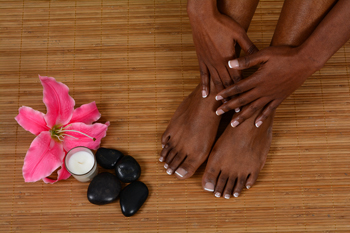 When it comes to foot care, there are a few simple activities you can perform daily to ensure the health of your feet. For starters, it’s important to clean your feet and regularly wash and dry them before putting on shoes and socks. To prevent dryness and possible cracking of the heels or ankles, use a moisturizer daily, preferably one recommended by a podiatrist. Please note, however, to not moisturize between your toes because they will not dry properly. To avoid complications with your toe nails, be sure to cut nails straight across while also avoiding digging into the sides of the nails. Lastly, try to change your shoes everyday. Because the area inside your shoes is dark, wet, and warm, there is a strong chance bacteria and fungus may form if they are not changed regularly. By performing these activities, you may prevent foot odor as well as a variety of conditions such as athlete’s foot and ingrown toenails. If you do experience any issues with your feet, we recommend it is best that you see a podiatrist for a proper diagnosis and advised treatment regime.
When it comes to foot care, there are a few simple activities you can perform daily to ensure the health of your feet. For starters, it’s important to clean your feet and regularly wash and dry them before putting on shoes and socks. To prevent dryness and possible cracking of the heels or ankles, use a moisturizer daily, preferably one recommended by a podiatrist. Please note, however, to not moisturize between your toes because they will not dry properly. To avoid complications with your toe nails, be sure to cut nails straight across while also avoiding digging into the sides of the nails. Lastly, try to change your shoes everyday. Because the area inside your shoes is dark, wet, and warm, there is a strong chance bacteria and fungus may form if they are not changed regularly. By performing these activities, you may prevent foot odor as well as a variety of conditions such as athlete’s foot and ingrown toenails. If you do experience any issues with your feet, we recommend it is best that you see a podiatrist for a proper diagnosis and advised treatment regime.
Everyday foot care is very important to prevent infection and other foot ailments. If you need your feet checked, contact one of our podiatrists from Lovely Foot Associates, PC. Our doctors can provide the care you need to keep you pain-free and on your feet.
Everyday Foot Care
Often, people take care of their bodies, face and hair more so than they do for their feet. But the feet are a very important aspect of our bodies, and one that we should pay more attention to. Without our feet, we would not be able to perform most daily tasks.
It is best to check your feet regularly to make sure there are no new bruises or cuts that you may not have noticed before. For dry feet, moisturizer can easily be a remedy and can be applied as often as necessary to the affected areas. Wearing shoes that fit well can also help you maintain good foot health, as well as making it easier to walk and do daily activities without the stress or pain of ill-fitting shoes, high heels, or even flip flops. Wearing clean socks with closed shoes is important to ensure that sweat and bacteria do not accumulate within the shoe. Clean socks help to prevent Athlete’s foot, fungi problems, bad odors, and can absorb sweat.
If you have any questions please feel free to contact our office located in Johnstown, PA . We offer the newest diagnostic and treatment technologies for all your foot and ankle needs.
Read more about Every Day Foot Care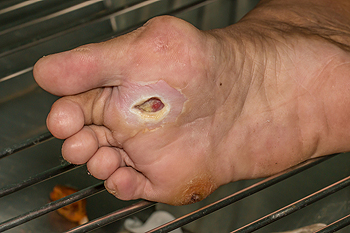 Diabetic patients often develop foot conditions as a result of elevated glucose levels in the bloodstream. It can be common for neuropathy to develop, which may cause difficulty in feeling existing cuts or bruises that may be on the feet. Research has indicated that calluses can develop quicker in people who have diabetes, and it may be beneficial to have your podiatrist properly cut out the calluses. If a foot ulcer develops, it typically requires immediate treatment. They are generally found at the base of the big toe, or on the ball of the foot. If it is neglected, an infection may develop, and this may lead to amputation. A proper diagnosis can include having an X-ray taken, which will be helpful in determining if the bone is infected. If you have diabetes, it is strongly recommended that you seek the care of a podiatrist who can help you to maintain this condition.
Diabetic patients often develop foot conditions as a result of elevated glucose levels in the bloodstream. It can be common for neuropathy to develop, which may cause difficulty in feeling existing cuts or bruises that may be on the feet. Research has indicated that calluses can develop quicker in people who have diabetes, and it may be beneficial to have your podiatrist properly cut out the calluses. If a foot ulcer develops, it typically requires immediate treatment. They are generally found at the base of the big toe, or on the ball of the foot. If it is neglected, an infection may develop, and this may lead to amputation. A proper diagnosis can include having an X-ray taken, which will be helpful in determining if the bone is infected. If you have diabetes, it is strongly recommended that you seek the care of a podiatrist who can help you to maintain this condition.
Diabetic foot care is important in preventing foot ailments such as ulcers. If you are suffering from diabetes or have any other concerns about your feet, contact one of our podiatrists from Lovely Foot Associates, PC. Our doctors can provide the care you need to keep you pain-free and on your feet.
Diabetic Foot Care
Diabetes affects millions of people every year. The condition can damage blood vessels in many parts of the body, especially the feet. Because of this, taking care of your feet is essential if you have diabetes, and having a podiatrist help monitor your foot health is highly recommended.
The Importance of Caring for Your Feet
Patients with diabetes should have their doctor monitor their blood levels, as blood sugar levels play such a huge role in diabetic care. Monitoring these levels on a regular basis is highly advised.
It is always best to inform your healthcare professional of any concerns you may have regarding your feet, especially for diabetic patients. Early treatment and routine foot examinations are keys to maintaining proper health, especially because severe complications can arise if proper treatment is not applied.
If you have any questions please feel free to contact our office located in Johnstown, PA . We offer the newest diagnostic and treatment technologies for all your foot and ankle needs.
Read more about Diabetic Foot Care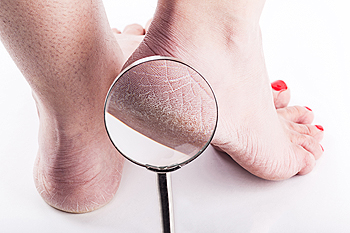 The condition that is known as cracked heels may occur as a result of frequently wearing shoes that have an open back. Additional reasons why this ailment may develop can consist of standing on hard surfaces for the majority of the day, or from medical conditions such as eczema or psoriasis. The skin on the outer edge of the heel is generally affected, and the cracks, or fissures can become painful if they are left untreated. Moderate relief can be found when the feet are washed and dried, followed by using a good moisturizer several times per day. If the skin on the heel begins to bleed, it is strongly suggested that you be under the care of a podiatrist who can properly treat and manage cracked heels.
The condition that is known as cracked heels may occur as a result of frequently wearing shoes that have an open back. Additional reasons why this ailment may develop can consist of standing on hard surfaces for the majority of the day, or from medical conditions such as eczema or psoriasis. The skin on the outer edge of the heel is generally affected, and the cracks, or fissures can become painful if they are left untreated. Moderate relief can be found when the feet are washed and dried, followed by using a good moisturizer several times per day. If the skin on the heel begins to bleed, it is strongly suggested that you be under the care of a podiatrist who can properly treat and manage cracked heels.
Cracked heels are unsightly and can cause further damage to your shoes and feet. If you have any concerns, contact one of our podiatrists from Lovely Foot Associates, PC. Our doctors can provide the care you need to keep you pain-free and on your feet.
Cracked Heels
Cracked heels appear unappealing and can make it harder for you walk around in sandals. Aside from looking unpleasant, cracked heels can also tear stockings, socks, and wear out your shoes. There are several methods to help restore a cracked heel and prevent further damage.
How Do You Get Them?
Dry skin is the number one culprit in creating cracked heels. Many athletes, walkers, joggers, and even swimmers suffer from cracked heels. Age and skin oil production play a role to getting cracked heels as well.
Promote Healing
Over the counter medicines can help, especially for those that need instant relief or who suffer from chronic dry feet.
Wear Socks – Wearing socks with medicated creams helps lock in moisture.
Moisturizers – Applying both day and night will help alleviate dryness which causes cracking.
Pumice Stones – These exfoliate and remove dead skin, which allows for smoother moisturizer application and better absorption into the skin.
Change in Diet
Eating healthy with a well-balanced diet will give the skin a fresh and radiant look. Your body responds to the kinds of food you ingest. Omega-3 fatty acids and zinc supplements can also revitalize skin tissue.
Most importantly, seek professional help if unsure how to proceed in treating cracked heels. A podiatrist will help you with any questions or information needed.
If you have any questions, please feel free to contact our office located in Johnstown, PA . We offer the newest diagnostic and treatment technologies for all your foot care needs.